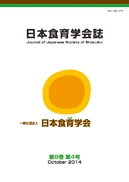
- 4 号 p. 269-
- 3 号 p. 189-
- 2 号 p. 113-
- 1 号 p. 13-
- |<
- <
- 1
- >
- >|
-
廣繁 理美, 高増 雅子2019 年 13 巻 3 号 p. 189-200
発行日: 2019/07/25
公開日: 2019/11/07
ジャーナル フリーIn this study, we conducted an analysis of meals served at kodomo-shokudos (eateries for children) in order to identify the current practices and issues in meal provision. The survey was conducted between July and August 2017. Analysis was performed on a total of 942 dishes from 190 meal plans offered at 102 eateries (51.0% response rate).
Based on the standards of the Japanese Food Guide Spinning Top, meal plans at eateries were categorized according to food content, and 88.4% of plans were found to incorporate three major dish groups (“grain dishes,” “fish and meat dishes,” and “vegetable dishes”). A large proportion of eateries serving “4 to 6 dishes” per meal plan emphasized festivity themes, seasonal items, nutritional value, price, and combining “grain dishes,” “fish and meat dishes,” and “vegetable dishes” when planning meals. The majority of eateries “purchased” their foods, while some responded that they “brought” their foods. There is an urgent need to ensure a stable food supply and create a support system.
As traditional Japanese dishes and dishes incorporating regional food culture were served at these eateries, kodomo-shokudos could possibly serve as a venue for food education (shokuiku) through meals.
It is important for kodomo-shokudos to create environments where children can enjoy sitting around the table and eating together. This study highlighted the need to discuss ways of providing support suitable for individual circumstances and to create such a support system so that ideal meals are provided to support the healthy growth of children.
抄録全体を表示PDF形式でダウンロード (2139K) -
太田 雅規, 梅木 陽子, 安倍 ちか, 江副 貴子, 浜谷 小百合, 沖田 千代2019 年 13 巻 3 号 p. 201-210
発行日: 2019/07/25
公開日: 2019/11/07
ジャーナル フリーThe aim of this study is to examine the significance of family meals at breakfast by investigating the effects of childhood food environment on stress coping ability in adulthood and the resulting impacts on stress responses. The data sources included the responses to the Sense of Coherence Scale (SOC), the Stress Response Scale for Children (SRS-C), and information reported on food environment at breakfast, such as the absence of eating, family meals, and eating alone. Mothers were also asked to recall their own food environments during childhood. Responses were obtained from 260 children and 255 of their mothers, and these responses were used for the analysis. The SOC scores of the mothers and their children showed a significant positive relationship (ρ=0.158, p=0.011). There was a significant difference in the SOC scores among the food environments during the mothers’ childhoods (p for Kruskal-Wallis test=0.044), with the absence of eating being the least and the family meals being the most observed food environments. The relationship between the SOC and SRS-C scores among the children was significantly negative (ρ=-0.649, p<0.0001). Moreover, the eating alone experience of the mothers could be taken over by their children. In conclusion, our results showed that eating breakfast together as a family might influence stress coping ability in the future, reaffirming the significance of family meals at breakfast during childhood.
抄録全体を表示PDF形式でダウンロード (787K)
-
山下 三香子, 若林 良和2019 年 13 巻 3 号 p. 211-221
発行日: 2019/07/25
公開日: 2019/11/07
ジャーナル フリーThis study clarifies the possibility of the promoters of eating habits to contribute to the basic standards of the community-based integrated care by verifying the relationship of the promoters of eating habits and social capital.
We had group interview with the promoters of eating habits in Satsuma Sendai City area, toward to 6-10 promoters from each 5 groups. A total of 40 people were present. They had periodical study sessions with an administrative dietitian, a dietitian, and the community health nurse, and a unified policy with the specialized exchange of knowledge and information became the model. These activities lead to build up the trust in the local area and contributed to build a good network of connections with organization and qualification. In summary, they created a social capital of three elements (model, trust, and network). From these results, it was clear that the promoters of eating habits gained confidence pertaining to the diets of the people from the local area. The promoters of eating habits are considered as the shokuiku leaders and they contribute to the basic standard of the community based integrated care.
抄録全体を表示PDF形式でダウンロード (2066K)
-
島本 和恵, 須藤 紀子2019 年 13 巻 3 号 p. 223-237
発行日: 2019/07/25
公開日: 2019/11/07
ジャーナル フリーFor evidence-based nutrition counseling, we conducted a systematic review of published literature pertaining to the relationship between breast- or bottle feeding, nutrient intake, and physical development. We searched peer-reviewed research papers published between 1980 and 2018 within five literature databases. The two authors independently examined the titles, abstracts, and texts, extracting 17 papers that met inclusion criteria. After that, we manually searched references cited in the adopted articles. We found that for breastfed infants, iron and vitamin D intake should be encouraged beginning early in weaning. For the infants aged one year and older, intake of nutrients such as iron, zinc, and vitamin C should be encouraged, regardless of feeding method. Although breastfed infants tended to be smaller, there were no significant differences in BMI or overweight status related to feeding method. Physical development is not delayed in breast-fed infants compared to the bottle-fed infants, with differences potentially attributable to between-individual variations and infant formula ingredients.
抄録全体を表示PDF形式でダウンロード (3069K)
- |<
- <
- 1
- >
- >|